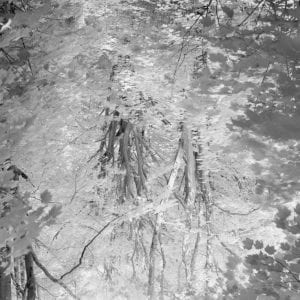“It has been hugely influential to have a range of different artists to work alongside, many of whom have practices outside of the MA and photography.”
Please tell us a bit about your work and your influences
I am a photographer who works primarily with traditional black and white processes, since the beginning of my photographic practice I have considered myself a photo therapist, looking at influences such as Jo Spence. In my practice I explore mental well-being through images of the natural world, these include woodland and aquatic landscapes, which are explored using both artificial and natural environments. My practice initially began exploring my own relationship with the seascape in consideration to my own mental health journey, through my MA I have expanded my practice to explore the effects human encounters with the natural world can have on our emotional states. This current project, Branches of the Mind, explores emotional states of the mind through the landscape of the forest. The photographs shown in this series reflect the different realities and perspectives our minds construct while in these emotional states. Using infrared film the work captures infrared light from the red end of spectrum, a light not visible to the naked eye – this creates a contrasting reality to the one seen in front of the camera. Through the process of darkroom printing the images are intentionally situated upside down to further distort the perspective of the landscape.
Can you tell us a bit about your journey to you course and made you choose it?
I completed my BA in Photography at the University of Brighton in 2018, the three years I spent there were critical to my photography practice. It was during my BA I was introduced to analogue photography and darkroom printing; this has become a huge part of my practice. I had considered doing an MA straight after my BA, however, was advised against it by family and friends. After a couple years traveling and a year of Covid-19 I felt disconnected from the art world and my photography practice, I felt as though this would be the perfect time to start my MA.
What were the highlights of the course for you?
The highlight of the course for sure has been the variety of people on the MA that I have been able to connect with. The MA attracts people from all different stages and walks of life and this is a totally different experience to the one I had on my BA. It has been hugely influential to have a range of different artists to work alongside of – many of whom have practices outside of the MA and photography.
Was the location of your course in Brighton important?
I never considered applying for an MA anywhere other than Brighton, I live in Seaford so location-wise it made sense, but having completed my BA there I was aware of how good the facilities were and how much support you got from staff, in particular the photography technicians. Brighton is such a vibrant and inspirational city with numerous galleries, collaboration opportunities, and organisations such as Photo Fringe.
What are your plans after graduation? What’s next for you?
I want to continue my current project and further my practice – I want to explore different varieties of landscapes. I am in the process of applying for competitions and contacting galleries in the hope of exhibiting my work. I am also planning to open my own darkroom, with an attached gallery space. I particularly want to create a space for students and new artists to be able to show their work and gain exhibition experience, as well as an affordable space for people to continue their practice after their studies have finished.
What advice would you give to someone considering doing postgraduate study?
Make sure it’s the right time and choose the part-time option. Unless you can afford to do a year, full time, and without working, the part-time option allows you more time to be able to work alongside completing your studies (although it’s still a challenge). Part-time also gives you access to university facilities for two years which is an opportunity you don’t want to miss! The biggest difference I have found in a postgraduate course compared to my undergrad is the amount of independent study there is. MAs have much less contact time, especially towards the end of your studies, this is of course to prepare you for the ’real world’, but you must be prepared for this because if you are joining shortly after a BA it can be a bit of a shock. It has been the best decision I have made and worth all the endless days and late nights.
Follow Lizzie on Instagram @lizziebrewster.photography
Find out more about MA Photography
Watch out for news about the Graduate Summer Show
Follow the Brighton Summer Shows on Instagram




